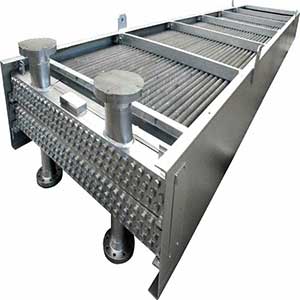Introduction:
Air cooled heat exchangers are water shortage and increasing costs, together with more recent concerns about water pollution and cooling tower plumes, have greatly reduced industry’s use of water cooled heat exchangers. Consequently, when further heat integration within the plant is not possible, these are now usual to reject heat directly to the atmosphere, and a large proportion of the process cooling in refineries and chemical plants takes place in that Exchangers .air cooled equipment can be a more simple solution against water cooled because in water cooled systems typically there is also a need for more pumps, piping, central chillers or cooling towers increasing the operating cost and maintenance of the system.
Image :

Process :
The air cooled heat exchangers system consists of an aluminium coated steel flat duct. Aluminium finings between the flat ducts are hard-soldered to the aluminium coating of the flat duct. There is also increasing use of Air Cooled Condensers for power stations. The basic principles are the same but these are specialized items and are normally configured as an A-frame or “roof type”.these are may be very large—the condensers for a 4000 MW power station in South Africa have over 2300 tube bundles, 288 fans each 9.1 m in diameter and a total plot area 500 m × 70 m. The solder fills the gap between the fin root and the core tube completely to achieve excellent heat transfer properties.
Features :
- Used across several industries
- Hi tech technology used
- Top class quality
- Excellent performance
- High durability
- Low cost
- Low maintenance
- Designed and constructed as per is, din or team std
- Deprived from intermixing fluids
- Construction is done to make the shell & tube sheet materials wieldable
- U-tube bundle : this type of heat exchanger finds applications in fuel systems like fuel oil suction heater. If the tube side velocity is less and the allowable pressure drop is less, this type is preferred. This type is suitable for condensing vapours and clean tube side fluids
Advantages :
- Prevention of thermal and chemical pollution of cooling fluids (closed circuits)
- Flexibility for any plant location and plot plan arrangement (installation over other units)
- Reduction of maintenance costs
- Easy installation by bolted assembly
- Lower environmental impact than shell and tube heat exchangers thanks to the elimination of an auxiliary water supply
Applications :
- Forced and induced draft air cooled heat exchangers
- Recirculation and shoe-box air cooled heat exchangers
- Hydrocarbon process and steam condensers
- Large engine radiators
- Turbine lube oil coolers
- Turbine intercoolers
- Natural gas and vapour coolers
- Combustion pre-heaters
- Flue gas re-heaters
- Lethal service
- Unique customizations
- Fertilizer plants
- Chemical and petrochemical plants
- Dairies and defence factories
- Automobile industry
- Cement and sugar industries
- Machine tools manufacturing unit
18.Furnaces manufacturing unit - Diesel gen-set manufacturing unit
- Air gas compressors manufacturing unit.